Practical, Timely Lessons for Advancing and Aligning North Carolina's Health Care Transformation Leadership to Address Social Needs
Background
In October 2018, the Centers for Medicare & Medicaid Services (CMS) approved North Carolina’s Section 1115 waiver to move the state’s Medicaid system from fee-for-service to a managed care program. A key part of this 1115 waiver is a groundbreaking demonstration project, the Healthy Opportunities Pilots, to pay for and deliver services to address unmet social needs in three regions across North Carolina. In the program, each pilot region’s Network Lead organization—with support from managed care plans in identifying patients, assessing needs, collecting data, and managing budgets—oversees a network of local human service organizations to pay for and deliver evidence-based interventions that address unmet needs in food, housing, transportation, interpersonal safety and toxic stress. In July 2021, the Pilots officially began its capacity-building phase, during which $100 million supported the Network Leads to do things like establishing policies, hiring staff, and building their network of human service organizations. Service delivery launched in phases, beginning in early 2022. In October 2024, CMS approved North Carolina's request to extend the Healthy Opportunities Pilots program for an additional five years.
Project Overview
Given the substantial challenges that exist for integrating health and social services, there is need for timely and practical guidance. This project’s objective is to understand real-world experiences in designing and implementing the Healthy Opportunities Pilots, in order to generate learnings and insights to improve the implementation of the Pilots, North Carolina’s broader Medicaid transformation, and similar initiatives by other states or payers to address social needs.
The first phase of our project was funded as part of the Robert Wood Johnson Foundation’s “Research in Transforming Health and Health Care Systems” program, which sought to build the evidence base on the potential effects of policies or policy changes intended to transform health and health care systems. We initially studied North Carolina’s COVID-19 Support Services Program—developed during the COVID-19 public health emergency to address multiple pandemic-related social needs—as it is informally seen as a smaller-scale preview of Pilots due to similarities in design and service provision.
The second phase of our project, which was funded by the Kate B. Reynolds Charitable Trust, extended our work into the first two years of service provision of the Healthy Opportunities Pilots and allowed us to generate insights and lessons learned from NC health care stakeholders conducting innovative work to address social needs outside of the Pilots.
The current phase of our research, funded by the Kate B. Reynolds Charitable Trust, further extends our work as the Healthy Opportunities Pilots program continues to grow and evolve.
Throughout this project, we have convened local and national stakeholders; interviewed stakeholders involved in the design and implementation of the Pilots and similar efforts; held focus groups with recipients of Pilots services; published timely policy guidance based on our research activities; and disseminated project findings to local and national audiences.
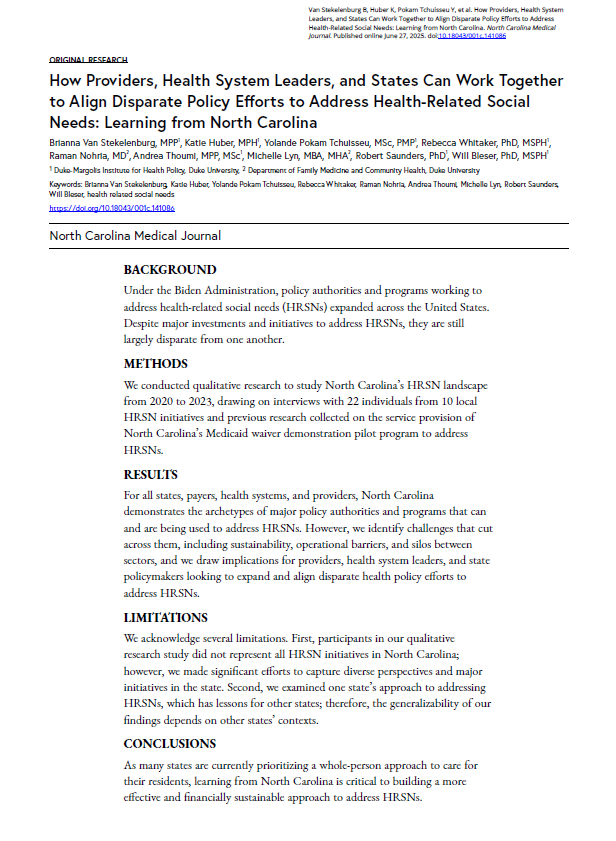
How Providers, Health System Leaders, and States Can Work Together to Align Disparate Policy Efforts to Address Health-Related Social Needs: Learning from North Carolina
Journal Article - June 2025
In this paper, by examining North Carolina’s health-related social needs (HRSN) landscape, we aim to draw implications for provider, health system, and state leadership looking to expand and align disparate health policy-led efforts to address HRSNs. Examining North Carolina as a state provides a holistic look at what major mechanisms can be used to address HRSNs and provides an opportunity to share challenges that cut across disparate health policy efforts.
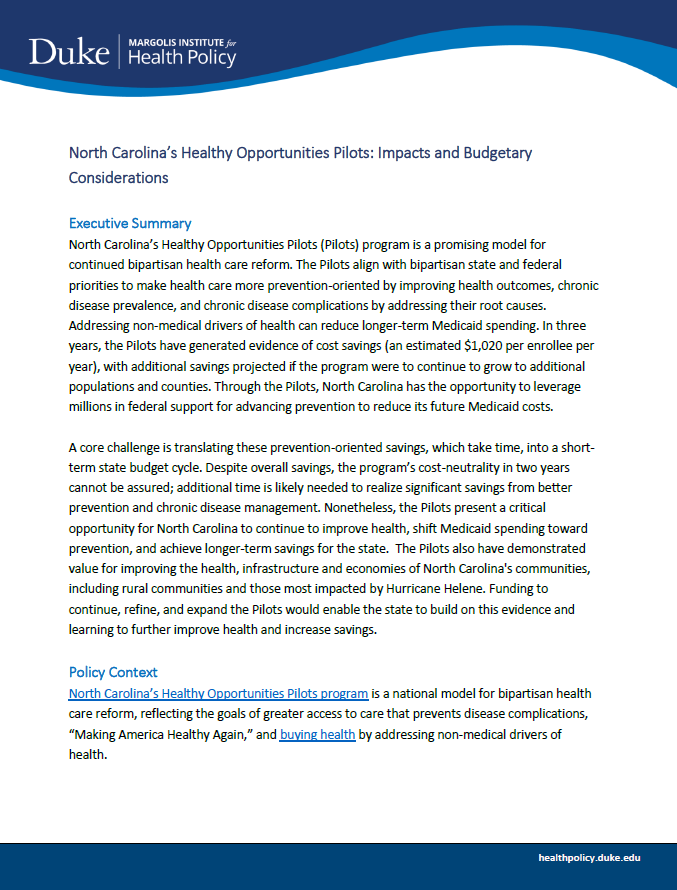
North Carolina's Healthy Opportunities Pilots: Impacts and Budgetary Considerations
Brief - June 2025
North Carolina’s Healthy Opportunities Pilots (Pilots) program is a promising model for continued bipartisan health care reform. The Pilots align with bipartisan state and federal priorities to make health care more prevention-oriented by improving health outcomes, chronic disease prevalence, and chronic disease complications by addressing their root causes. Addressing non-medical drivers of health can reduce longer-term Medicaid spending. In three years, the Pilots have generated evidence of cost savings (an estimated $1,020 per enrollee per year), with additional savings projected if the program were to continue to grow to additional populations and counties. Through the Pilots, North Carolina has the opportunity to leverage millions in federal support for advancing prevention to reduce its future Medicaid costs.

Bipartisan Innovation in Action: The Role of North Carolina’s Healthy Opportunities Pilots in Advancing Whole-Person, Cost-Effective Care
Webinar - March 2025
The Duke-Margolis Institute for Health Policy is hosting a webinar highlighting practical strategies for addressing underlying drivers of health, drawing on North Carolina’s growing experience through its groundbreaking Healthy Opportunities Pilots program. The Pilots program addresses drivers of health related to food, housing, transportation, interpersonal safety, and toxic stress by linking eligible Medicaid members to community-based organizations providing evidence-based services to address these needs. The Pilots program currently operates in a third of the state, in largely rural areas, and it has the potential to expand statewide in the future.
This webinar will offer attendees a deeper understanding of the strategic and operational elements that make the Pilots a promising model for bipartisan health reform, offering valuable lessons for policymakers, payers, health care providers, and community leaders in North Carolina and beyond. Speakers will highlight examples of the Pilots’ impacts on health, well-being, and local economies in communities across the state, as well as areas where evidence is still emerging.
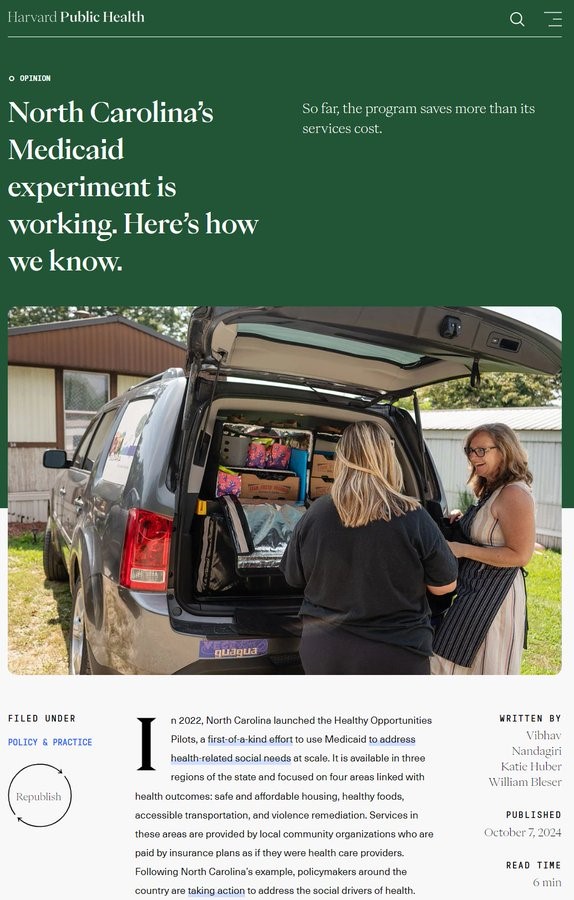
North Carolina’s Medicaid experiment is working. Here’s how we know.
Op Ed - October 2024
In Harvard Public Health Magazine, Margolis researchers Vibhav Nandagiri, Katie Huber, and William Bleser write about why the evidence and experiences to date suggest North Carolina Medicaid's Healthy Opportunities Pilots program should be renewed and expanded statewide.
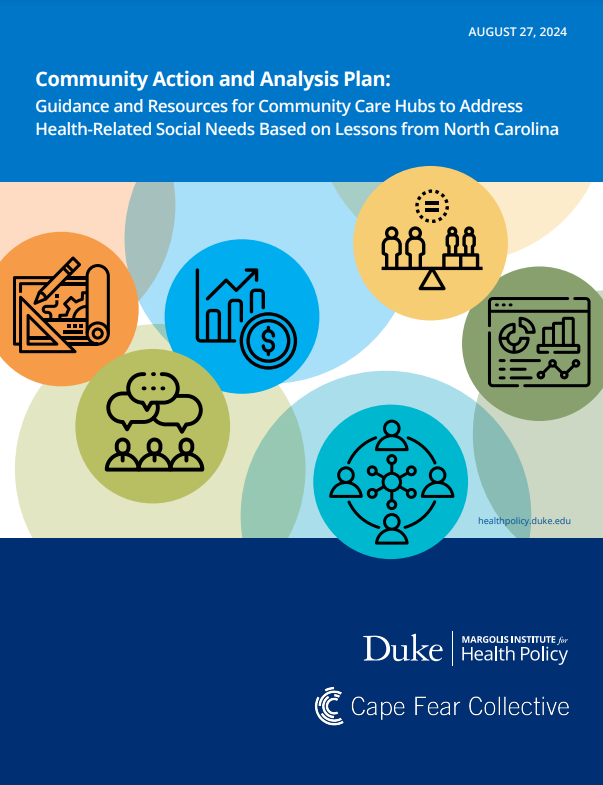
Community Action and Analysis Plan: Guidance and Resources for Community Care Hubs to Address Health-Related Social Needs Based on Lessons from North Carolina
Community Action and Analysis Plan - August 2024
Addressing unmet health-related social needs (HRSNs) is critical to improving health outcomes and requires well-coordinated systems of health and social care. Community Care Hubs (CCHs) – community-centered backbone organizations that coordinate care between the health and social sectors – play a critical role in developing these coordinated systems of care. CCHs are designed to organize, support, and provide centralized infrastructure for community-based organizations (CBOs) and other service providers that are participating in cross-sectoral partnerships.
CCHs serve a critical role in their communities, but the scope and capacity of CCHs can vary. Given this, there is a need for additional guidance and support to start, scale, and sustain the work of CCHs. The purpose of this Community Action and Analysis Plan is to highlight practical steps that future and current CCHs can take to start, scale, and sustain efforts to address HRSNs. From our research, we identified six major competency areas for CCHs. Below is a high-level summary of the main steps that CCHs can take across the six competencies outlined in this document. This is meant to serve as both a self-assessment tool and a guide through the document’s main points. Within each section, we describe examples of data, resources, and partnerships that can support these efforts, including both foundational skills and advanced steps. Readers can choose to review and focus on topics that are of particular interest and are directed to external sources to read more when such external resources exist.
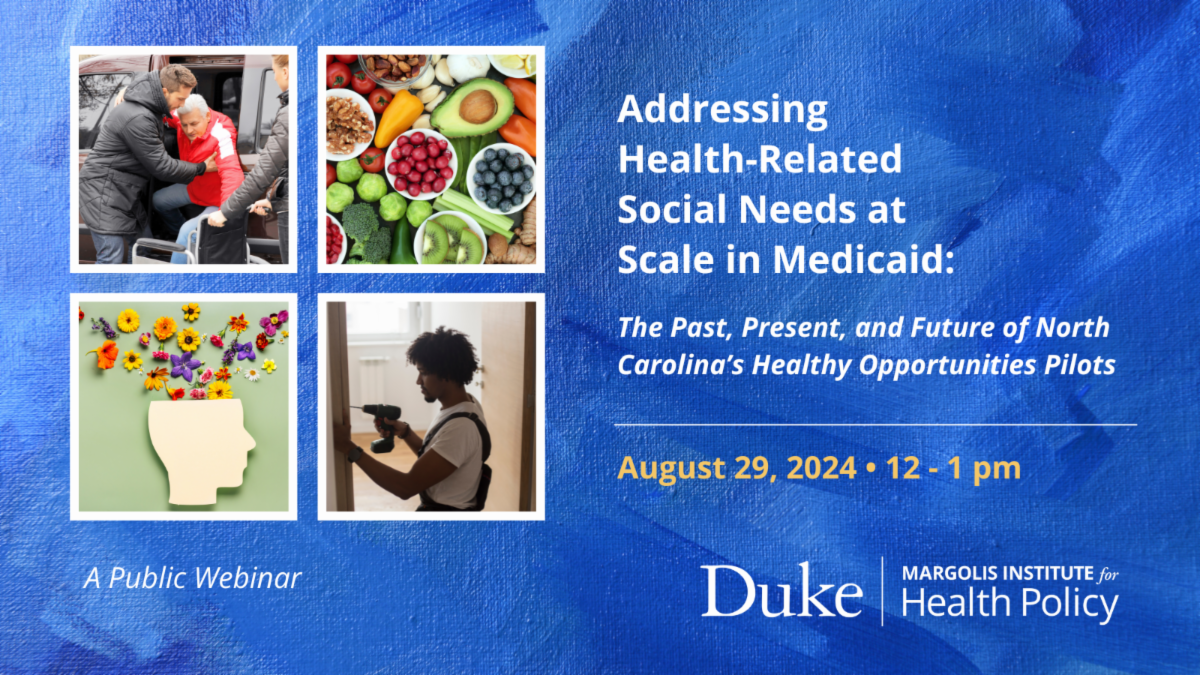
Addressing Health-Related Social Needs at Scale in Medicaid: The Past, Present, and Future of North Carolina’s Healthy Opportunities Pilots
Webinar - August 2024
Duke-Margolis and the North Carolina Institute of Medicine hosted a webinar to discuss the lessons learned during the first two years of Healthy Opportunities Pilots implementation as well as the future of the program. The discussion aimed to inform not just North Carolina audiences but also those in other states looking to address health-related social needs at scale.
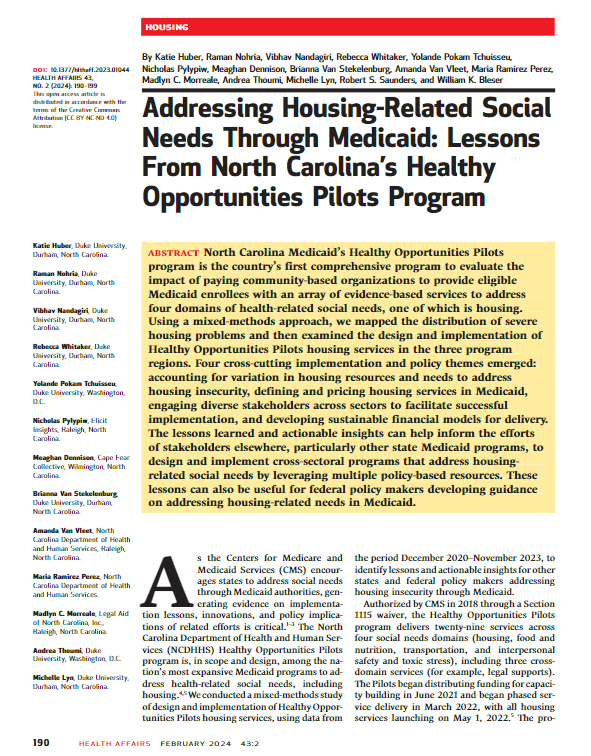
Addressing Housing-Related Social Needs Through Medicaid: Lessons From North Carolina’s Healthy Opportunities Pilots Program
Research Article - February 2024
Using a mixed-methods approach, Duke-Margolis researchers mapped the distribution of severe housing problems and then examined the design and implementation of the Pilots housing services in the three program regions. Four cross-cutting implementation and policy themes emerged: accounting for variation in housing resources and needs to address housing insecurity, defining and pricing housing services in Medicaid, engaging diverse stakeholders across sectors to facilitate successful implementation, and developing sustainable financial models for delivery.
Addressing Social Needs through Medicaid: Lessons from Planning and Early Implementation of North Carolina’s Healthy Opportunities Pilots
Policy Report - September 2023
States, payers, and health systems across the United States are developing cross-sectoral solutions to address health-related social needs. However, most evidence on the effectiveness of these interventions to date is from time-limited interventions focused on specific subpopulations or services and often in urban areas only. In 2019, as part of North Carolina’s Section 1115 Medicaid Demonstration, the Centers for Medicare & Medicaid Services (CMS) authorized up to $650 million in Medicaid funding to implement the Healthy Opportunities Pilots (“Pilots”). To support the implementation of the Pilots, we conducted a multi-method qualitative study to generate timely and practical findings and recommendations from the planning, capacity-building, and early implementation of the program. Through this report, we offer key findings that can be useful for the Pilots’ policymakers, implementors, and providers, as well other stakeholders interested or involved in similar or smaller-scale initiatives in other states.

North Carolina’s Healthy Opportunities Pilots: A Medicaid Managed Care Program to Address Social Needs
Webinar - July 2022
This webinar provided an overview of practical cross-cutting themes from the planning, capacity-building, and early implementation periods of the Healthy Opportunities Pilots, including successes, lessons learned, challenges encountered, and innovative solutions for overcoming challenges. Policymakers, researchers, evaluators, implementation leaders, and frontline providers shared their experiences over the past two years, thoughts on the future of the program, and lessons for similar programs.
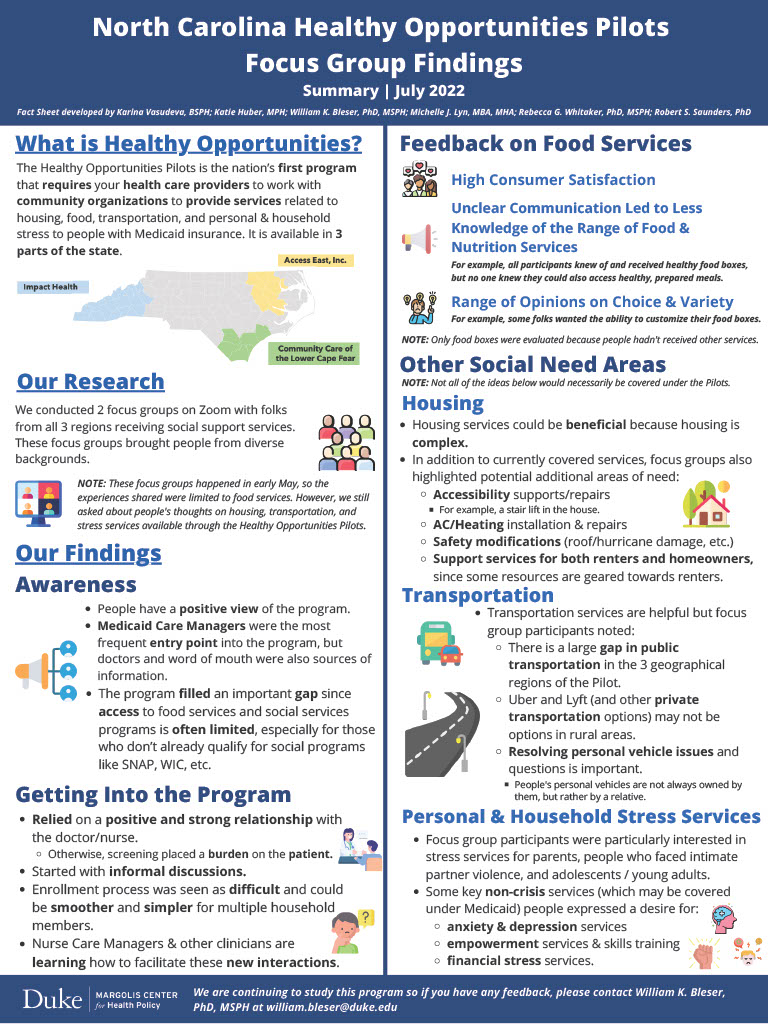
North Carolina Healthy Opportunities Focus Group Findings
Fact Sheet - July 2022
This fact sheet describes key takeaways from focus groups conducted to assess the initial awareness of and access to the Healthy Opportunities Pilots services in North Carolina.
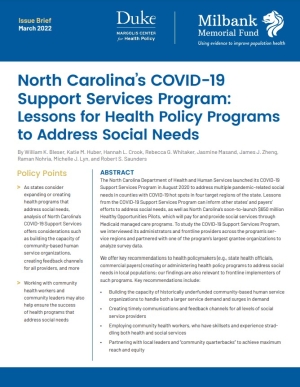
North Carolina’s COVID-19 Support Services Program: Lessons for Health Policy Programs to Address Social Needs
Policy Brief - March 2022
The North Carolina Department of Health and Human Services launched its COVID-19 Support Services Program in August 2020 to address multiple pandemic-related social needs in counties with COVID-19 hot spots in four target regions of the state. Lessons from the COVID-19 Support Services Program can inform other states’ and payers’ efforts to address social needs, as well as North Carolina’s soon-to-launch $650 million Healthy Opportunities Pilots, which will pay for and provide social services through Medicaid managed care programs. We offer key recommendations to health policymakers (e.g., state health officials, commercial payers) creating or administering health policy programs to address social needs in local populations; our findings are also relevant to frontline implementers of such programs.
Duke-Margolis Team

Rebecca Whitaker, PhD, MSPH
Research Director, North Carolina Health Care Transformation
Core Faculty Member
Senior Team Member

Katie Huber, MPH
Policy Research Associate

Brianna Van Stekelenburg, MPP
Research Associate
Alida Austin
Policy Research Assistant

Robert Saunders, PhD
Senior Research Director, Health Care Transformation
Adjunct Associate Professor
Executive Team Member
Margolis Core Faculty
Rebecca Stern
Margolis Intern

Veronica Marshall-Kirk
2024 Margolis Intern
Vibhav Nandagiri, BA '25
Margolis Scholar
2023 Margolis Intern

Jessye Halverson, MPP '22
Margolis Scholar

Karina Vasudeva
2022 Margolis Intern

James Zheng
2020 Margolis Intern
2021 Margolis Intern

Jasmine Masand, (MPP '21)
Anti-Racism and Equity Committee Member
Additional Collaborators
Michelle Lyn, Assistant Professor in Family Medicine and Community Health at Duke University
Raman Nohria, Family Medicine Physician and Medical Instructor at the Duke Department of Family Medicine and Community Health
Will Bleser, Hannah Crook, Yolande Pokam Tchuisseu, and Andrea Thoumi (former Duke-Margolis Staff members)
